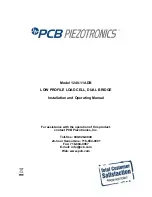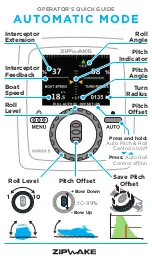
PCB Load & Torque, Inc.
Toll-Free in USA 866-684-7107
716-684-0001
www.pcbloadtorque.com
DUAL BRIDGE LOAD CELL OPERATION MANUAL
4
4.3 Threaded Tension Rods
NOTE: Threaded tension rods are an optional feature on the
dual bridge fatigue-rated load cell.
Installation of the load cell
starts with tension pre-loading
the load cell to 120-150% of
full scale capacity and lightly
tightening a jam nut to lock in
the preload on both the load cell
and base tension rods. Once the
preload tension is released, the
threads
will
be
securely
engaged.
Failure
to
pre-load
the
attachment rods/ fixtures can
result in damage to the threads
on the load cell and base during
cyclic load tests.
Threaded rods engaging the load cell should have Class 3
threads to ensure thread-to-thread close contact forces.
NOTE: It is important that the tension rods installed in the
load cell and base use full thread engagement, but are
not jammed, or torqued. They should be ½-1 turn
from the bottom of the threads in both the base and
load cell.
4.4 Mounting Optional Connector Protectors
Models 1403 and 1404 dual bridge fatigue-rated load cells do
not come standard with connector protectors. If optional
connector protectors are to be mounted, it is necessary to
consider the following:
4.4.1 Included Components in Kit (084A90)
4.4.2 Required Tools
4.4.3 Installation of Connector Protector
1.
Remove the #4-40 x 1/4” button head cap screws
from the connector using a 1/16” hex wrench as
shown in Figure 7.
2.
Carefully pull the connector from the load cell. Take
care to not break or loosen any wire connections.
3.
Slide the connector protector (54823-02) behind the
connector as shown in Figure 8.
4.
Apply a drop Loctite® Threadlocker Blue 242® to
the threads of the #4-40 x 3/8” socket head cap
screws.
NOTE: Please refer to the Loctite® Threadlocker Blue 242®
technical data sheet for directions of use.
5.
Attach the connector protector (54823-02) to the load
cell with the #4-40 x 3/8” socket head cap screws
using a 3/32” hex wrench as shown in Figures 9 and
10.
Bolt Size
Part Number
Installation Torque
1/4-28x1 3/4
100-8011-10
15-17 LbFt (180-204 LbIn)
3/8-24x2 1/4
100-8082-20
75-80 LbFt (900-960 LbIn)
1/2-20x3 1/2
100-8011-30
120-130 LbFt (1440-1560 LbIn)
3/4-16x4 1/2
100-10026-40
370-400 LbFt (4440-4800 LbIn)
Table 4
– Tension Base Installation Torque Values
Jam Nut
Preload (120-150% FS)
Pre-Tension
Stud w/3B
Threads
Jam Nut
Pre-Tension
Stud w/3B
Threads
Preload (120-150% FS)
Figure 4
– Installation of Pre-
Tension Studs
Table 5 - Kit Components
Component
Quantity
Connector Protector (54823-02)
2
#4-40 x 3/8” Socket Head Cap Screw
8
Figure 5 - Connector
Protector (54823-02)
Figure 6 - #4-40 x 3/8”
Socket Head Cap Screw
Table 6—Required Tools (Not Included)
1/16” Hex Wrench
3/32” Hex Wrench
Loctite® Threadlocker Blue 242®
Figure 7 - Remove the #4-40 x 1/4”
Button Head Cap Screws
Figure 8 - Slide the Connector
Protector (54823-02) Behind the
Connector


































